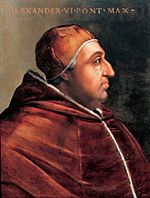Pope Alexander VI, Date of Birth, Place of Birth, Date of Death
TweetPope Alexander VI
pope of the Catholic Church 1492–1503
 Date of Birth: 01-Jan-1431
Date of Birth: 01-Jan-1431
 Place of Birth: Xàtiva, Valencian Community, Spain
Place of Birth: Xàtiva, Valencian Community, Spain
Date of Death: 18-Aug-1503
Profession: Catholic priest
Zodiac Sign: Capricorn 
About Pope Alexander VI
- Pope Alexander VI, born Rodrigo de Borja (Valencian: Roderic Llançol i de Borja [roðe'?ig ?an's?l i ðe 'b??d?a], Spanish: Rodrigo Lanzol y de Borja [ro'ð?i?o lan'?ol i ðe 'ßo?xa]; 1 January 1431 – 18 August 1503), was Pope from 11 August 1492 until his death.
- He is one of the most controversial of the Renaissance popes, partly because he acknowledged fathering several children by his mistresses.
- Therefore his Italianized Valencian surname, Borgia, became a byword for libertinism and nepotism, which are traditionally considered as characterizing his pontificate. A year after the election of his uncle as Pope Callistus III, Borgia was named vice-chancellor.
- He proceeded to serve in the curia under the next four popes, as well.
- Borgia was elected Pope in 1492, taking the name Alexander VI. Born in the territories of the Crown of Aragon in Spain, his bulls of 1493 confirmed or reconfirmed the rights of the Spanish crown in the New World following the finds of Christopher Columbus in 1492.
- During the second Italian war, Alexander VI supported his son Cesare Borgia as a condottiero for the French King.
- The scope of his foreign policy was to gain the most advantageous terms for his family.Two of Alexander's successors, Sixtus V and Urban VIII, described him as one of the most outstanding popes since Saint Peter.
Read more at Wikipedia


